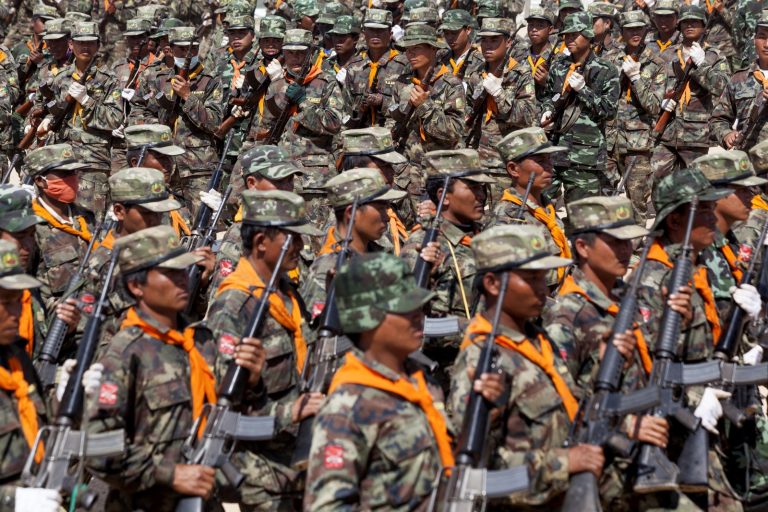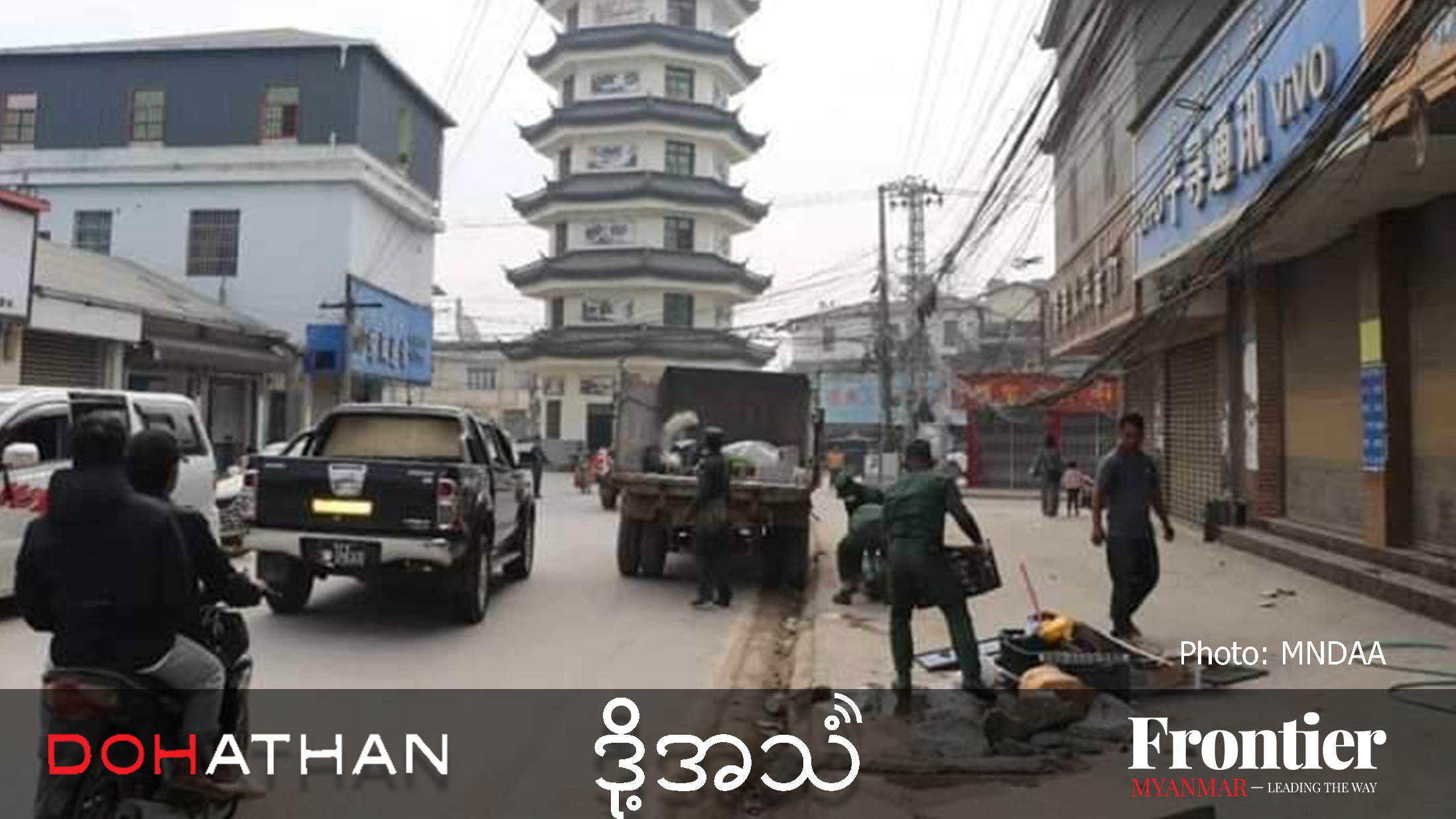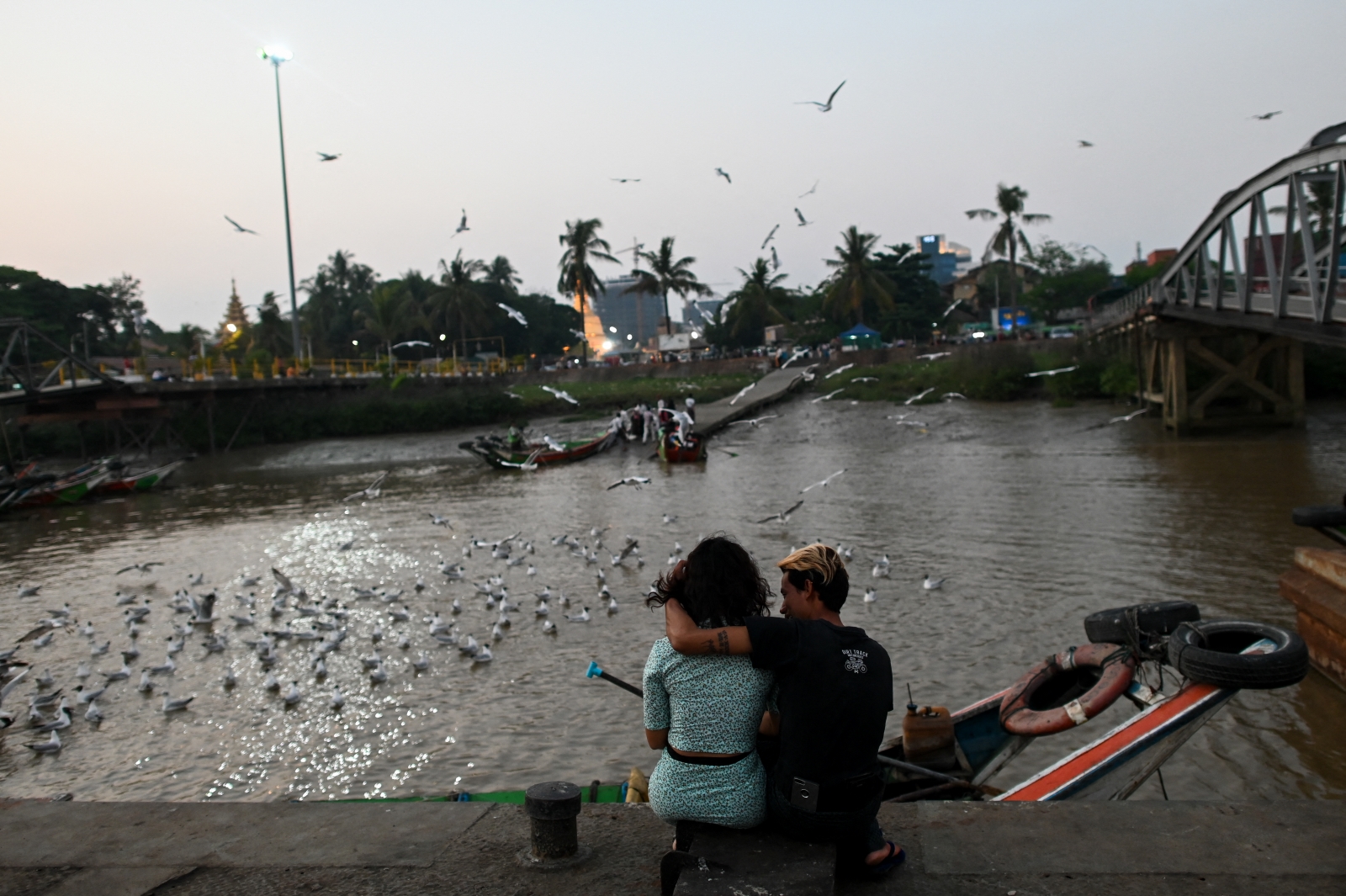Armed groups collecting taxes in Myanmar’s Lashio is nothing new, but a mysterious outfit is upping the ante by bombing public places if its demands are not met and refusing to negotiate.
By FRONTIER
Ko Myint Kyaw* was stunned on July 15 when CCTV footage circulated on Facebook, showing his sister and her husband parking outside a gold shop and leaving behind their motorcycle, which later exploded.
“Some people in Lashio do bombing work because they need money,” he said. “I had no idea my sister and her husband were involved.”
He rushed to her house, but found it empty – they had already been arrested, and are now awaiting trial in Lashio Prison. The explosion at Zwe Htet gold and jewelry shop killed one employee and injured a number of other employees and passersby. While one of the most dramatic recent events, it’s not an isolated incident.
Crime has become rampant in Lashio, the largest city in northern Shan State, which like many places in Myanmar, has seen a significant breakdown in rule of law since the 2021 military coup. The military’s North Eastern Command is headquartered in Lashio town, but even that is not deterring attacks.
Local sources say there have been at least 17 such bomb attacks in Lashio Township since the coup – at least eight this year alone. In another shocking recent incident, two people were killed and at least 10 injured at a Denko petrol station on the highway connecting Lashio and Mandalay on September 27. Some business sources said Denko was targeted because it refused to pay protection money.
No group has publicly claimed responsibility for the rash of bombings, but a shadowy organisation called the Bomb Attackers Group has been quietly contacting businesses and demanding tax money – or else.
The emergence of the bombing group, widely believed to be a criminal organisation without a political agenda, adds to an already heavy tax burden for local entrepreneurs.
Tax or extortion?
Before the coup, many businesses in Lashio were expected to pay taxes to the ethnic armed groups the Ta’ang National Liberation Army and Shan State Progress Party.
Since then, locals say the Kachin Independence Army has also moved into the area, further squeezing businesses. Once close allies, the KIA and TNLA have found themselves at loggerheads due to overlapping territorial claims and competing tax drives.
Ma Sandi*, a former Zwe Htet employee who was injured in the July blast, said the company was getting tax demands from all sides, but she doesn’t know if it was paying.
“Many groups were sending letters about taxation,” she said. The TNLA and SSPP sent official letters with their names on them, while at least two other anonymous groups also demanded payment.
U Myint Swe*, who owns a hotel in the township, said his tax burden is increasingly becoming untenable. He has been paying the TNLA and SSPP since 2016, started paying the KIA last year, and was contacted by the Bomb Attackers Group on messaging app Viber earlier this year.
Altogether, this adds up to K700 million per year, around US$335,000 at the official exchange rate.
“Our primary concern is bomb attacks,” said Myint Swe, who said he doesn’t believe ethnic armed groups are responsible.
He said that in the past, ethnic armed groups had never threatened to bomb businesses that refused pay taxes, more typically abducting them and holding them for ransom. U Kyaw Zin Tun*, an auto broker who has lived in Lashio since 2015, agreed.
“Since the coup, if you don’t pay tax, your business is more likely to be attacked by a motorcycle bomb. I’m not sure who they are, but they only use motorcycle bombs,” Kyaw Zin Tun told Frontier.
The bomb attackers
Ashin Pone Nya Nanda, a prominent monk in Lashio Township, said an atmosphere of fear has settled over the area, with ordinary people afraid to leave their homes because of increasing violence and lawlessness.
“Civilians should not be affected, but they are. The problem is between the armed groups and businessmen, and it should be resolved face to face. People are afraid of a bomb exploding near them if they go out,” the monk said.
TNLA spokesperson Tar Aik Kyaw insisted the group has never bombed or threatened to bomb businesses.
“If they [businesspeople] don’t pay their taxes, we will arrest them and our justice department will fine them. We take responsibility for taxpayer safety,” he told Frontier on October 25.
He even claimed the TNLA arrested three people in October who have used bomb threats to extort money. He said the detainees are being interrogated before being transferred to the TNLA’s justice department.
“We’re working hard to keep the public and taxpayers safe. We will continue to arrest, investigate and take action,” Aik Kyaw said.
For now, little is known about the Bomb Attackers Group, but they continue to make their presence known. Lashio resident U Min Thu* said a friend who runs a vehicle spare parts business received a call from the group demanding a payment of K20 million in August.
“The caller said that if he does not pay, the first bomb will be a warning. After that threat, my friend transferred the money using his Wave Money mobile wallet,” Min Thu said.
Two hoteliers in the township also told Frontier that they each paid K20 million to the Bomb Attackers Group in July.
“The so-called bomb attackers won’t negotiate. If they want K20 million, we have to pay,” said hotelier Daw Ei Kay Zin, who claimed ethnic armed groups are usually more open to negotiations.
Ei Kay Zin shared the phone number of the Wave Money account with Frontier, but it was no longer connected.
*indicates the use of a pseudonym for security reasons







